Do you know the right solar panel size for a 12V battery in off-grid use? If you’re in an RV, cabin, or camper, picking the right panel is key. It charges your battery well, cutting grid use and saving you money.
This guide will cover all you need for your 12V battery and solar panel. It starts with the basics and goes into detail to give you clear choices. See how using solar power helps the planet and your wallet.
Key Takeaways
- Determining the correct solar panel size for a 12V battery is essential for efficient energy use and battery longevity.
- This guide caters to individuals in RVs, campers, and off-grid homes.
- Properly sized solar panels can enhance sustainability and reduce energy costs.
- Leveraging solar panels minimizes dependency on the power grid.
- Understanding the relationship between battery capacity and solar panel wattage is key.
- Eco-friendly living can be achieved through effective solar power usage.
Introduction to Charging 12V Batteries with Solar Panel
Solar panels turn sunlight into electricity, making our energy use more sustainable. They’re especially important for people living off-grid in RVs, campers, or cabins. It’s key to know how to find the right size of solar panel for a 12V battery. This knowledge supports the move to use more renewable energy. It also saves money and helps the environment.
Why Use Solar Panels?
Solar panels have many benefits. They use a source of energy that won’t run out, which is great for the planet. When you use the sun to charge batteries, you help decrease our need for harmful fossil fuels. This helps our environment. Solar energy is key in taking care of our planet for the future.
Benefits of Solar Charging
Using the sun for energy means you’re not just saving the planet, you’re gaining independence. It’s a reliable and cheap way to keep your power running. This makes you less reliant on grid electricity. It also cuts down what you pay for power in the long run.
Plus, it supports the environment. Learning the right solar panel size for a 12V battery fits with the push for more renewable energy. It lets us store and use energy better, helping our planet.
Understanding 12V Battery Requirements
It’s key to know what a 12V battery needs for great solar panel use. You need to pick the right solar panel size by looking at the battery’s power and Ah ratings. It’s also important to know the battery type and how deeply it can be used, affecting your solar panel decision.
Battery Capacity and Amp-Hour Ratings
A 12V battery’s capacity is how much energy it can hold and give over time. If a battery is 100Ah, it can deliver 100 amps in an hour, or 10 amps in ten hours. Understanding Ah ratings helps you find solar panels that will match your energy use.
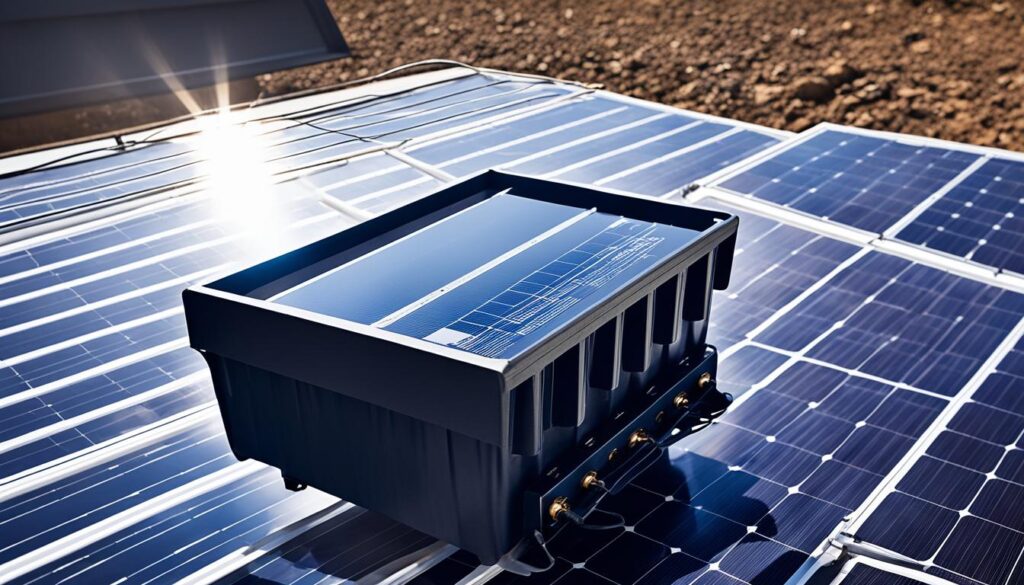
Types of 12V Batteries
There’s a range of 12V batteries, like lithium, lead-acid, and deep cycle, for solar use. Each type has its own features affecting the best solar panel size. For example, lithium batteries are efficient and last long. But lead-acid batteries are cheaper though need more care.
Battery Depth of Discharge
Depth of discharge (DoD) is how much of the battery’s charge has been used. With 50% DoD, half the battery’s capacity is used. The right DoD helps the battery last longer and the solar panel work better. A deep cycle battery, that can be used deeply, might need a different solar panel size, affecting how much power your 12v battery can get.
Determining the Right Solar Panel Size
Choosing what size solar panel to charge 12v battery involves key steps. First, you need to calculate the panel’s required wattage. This ensures your system works well. I’ll go over what you need to know to pick the right size solar panel for a 12V battery.
Calculating Wattage Needs
Start by figuring out the battery’s capacity in amp-hours (Ah). Knowing this helps us find the right solar panel size for 12v battery. Use this simple formula:
Battery Capacity (Ah) × Battery Voltage (V) = Desired Watt-Hours (Wh)
For instance, a 12V, 100Ah battery needs:
100 Ah × 12 V = 1200 Wh
This math sets the stage for choosing the solar panel size for 12v battery. Then, think about how fast you want to charge your battery. This affects how much energy your panel needs to make daily.
Factors Influencing Solar Panel Efficiency
Solar panel efficiency is affected by a few things that relate to your 12V battery:
- Sunlight Exposure: Daily sunlight levels change based on where you live, the weather, and the season.
- Panel Quality: Better solar panels produce more energy per square foot, which can mean you need a smaller one.
- Battery Chemistry: The type of battery – like lithium or lead-acid – affects how well it works with the solar panel.
Considering these points helps you match your solar panel to the 12V battery specs. This ensures your energy setup works as efficiently as possible.
| Battery Capacity (Ah) | Required Wattage (Wh) | Recommended Solar Panel Size (W) |
|---|---|---|
| 50 Ah | 600 Wh | 100-150 W |
| 100 Ah | 1200 Wh | 200-250 W |
| 200 Ah | 2400 Wh | 400-500 W |
Finding what size solar panel to charge 12v battery is precise yet simple. Get the calculations right and know what affects solar panel efficiency. Doing so ensures your solar system is dependable and sustainable.
What Size Solar Panel to Charge 12V Battery?
Choosing the right solar panel size for a 12V battery is key. It ensures your energy setup works well. It all comes down to the battery’s amp-hour rating. You need to know how this relates to the size of solar panel you require for the best performance.
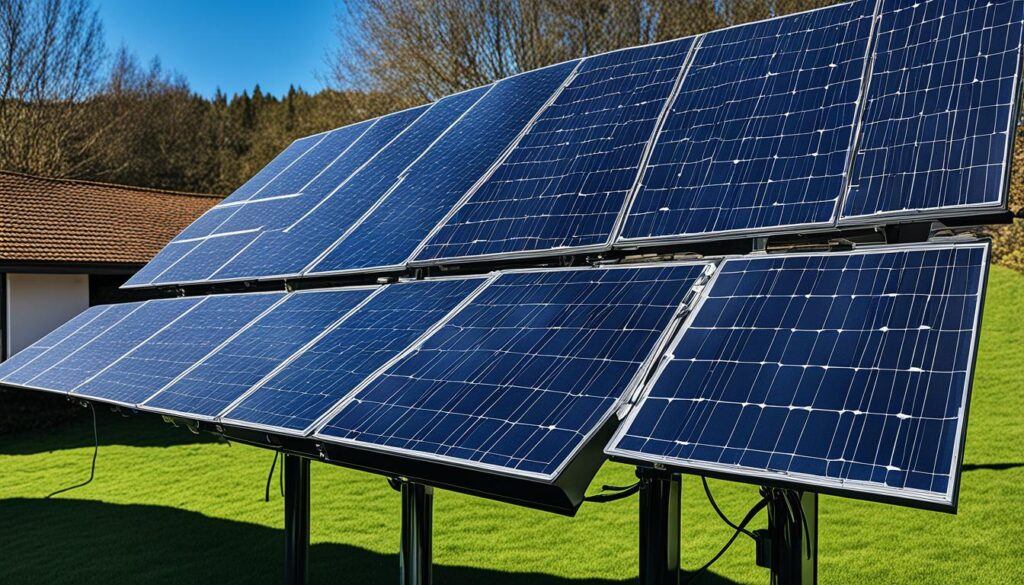
For a 50Ah 12V battery, you’d need a smaller solar panel. But the size isn’t just a guess. It depends on the panel’s wattage, how much sunlight it gets, and more. You have to do some calculations to get it right.
Now, let’s look at what you need for different battery sizes:
| Battery Capacity (Ah) | Recommended Solar Panel Wattage | Average Daily Sunlight Hours |
|---|---|---|
| 50Ah | 100W – 150W | 4 – 6 hours |
| 100Ah | 200W – 300W | 5 – 7 hours |
| 200Ah | 400W – 600W | 6 – 8 hours |
From the table, you see a 50Ah battery needs a 100W to 150W solar panel, depending on sunlight. For bigger batteries, like 100Ah or 200Ah, you need more watts.
Picking the right solar panel for your 12V system is more than just about size. It’s also about making sure you have power all the time. That’s why figuring out how much sun you get is crucial. It keeps your battery charged, even when it’s cloudy, for uninterrupted off-grid life.
To sum up, getting the correct solar panel size for your 12V battery is a mix of knowing your battery and understanding solar panel efficiency. With the correct setup, you can rely on solar power smoothly and effectively.
Importance of Solar Charge Controllers
Solar charge controllers are key in solar systems. They keep 12V batteries from overcharging. These devices manage power from solar panels to batteries. This makes the whole system work better for longer.
Pulse Width Modulation (PWM) Controllers
Pulse Width Modulation (PWM) controllers are budget-friendly. They control the power going to batteries. This stops overcharging. For smaller systems, they’re a great fit.
Maximum Power Point Tracking (MPPT) Controllers
Maximum Power Point Tracking (MPPT) controllers are more advanced. They adjust solar panel inputs for the best charging voltage. This makes power use more efficient, even in less ideal conditions. They’re best for bigger systems aiming for top efficiency, although they cost more.
Deciding on PWM or MPPT controllers depends on your solar needs and budget. For small projects, PWM is fine. MPPT is better for large, efficient systems.
| Controller Type | Cost | Efficiency | Best For |
|---|---|---|---|
| Pulse Width Modulation (PWM) | Low | Moderate | Small Systems |
| Maximum Power Point Tracking (MPPT) | High | High | Large Systems |
Step-by-Step Guide to Connecting Solar Panels to 12V Batteries
Starting a solar power system installation is a smart move for using clean energy. This guide will help you link solar panels to a 12V battery. You’ll learn about the tools needed, how to stay safe, and the steps to make a smooth setup.
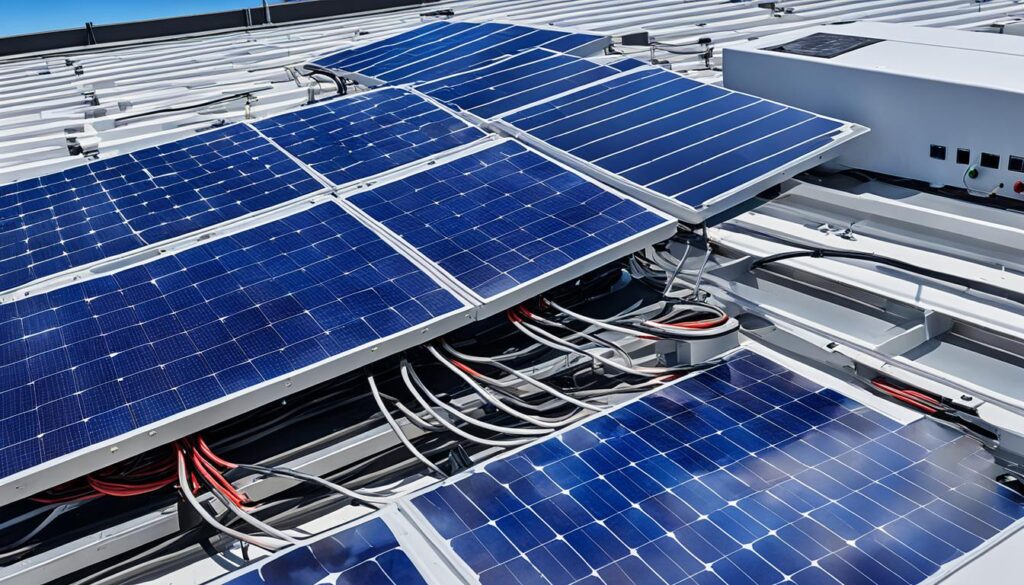
Required Tools and Components
First, gather these tools and parts:
- Solar panels
- Solar charge controller
- Battery cables
- Crocodile clips
- Multimeter
- Fuses and holders
- Adapters and connectors
Safety Precautions
Working with electricity needs you to be careful. Remember these safety tips:
- Always wear insulated gloves
- Make sure the power is off before you connect anything
- Avoid moist working conditions
- Check all connections are right before turning the power on
Connecting the System
- Mount the Solar Panels: Place them where they’ll get the most sunlight. Secure them well to avoid damage.
- Install the Charge Controller: Link the panels to the controller. Most controllers have obvious terminals for the solar panel input.
- Connect Charge Controller to Battery: With battery cables, connect the controller to the battery. Match the positive and negative ends correctly.
- Fuse Installation: Put fuses between the controller and the battery for protection against too much current.
- Verify Connections: Use a multimeter to check the voltage and make sure everything is connected right.
- Power Up: After checking everything, turn the system on. Watch the process as it starts to charge.
Linking solar panels to a 12V battery is easy with the right tools, safety tips, and this guide. You now have a working solar power system that uses the power of the sun. Enjoy your new, renewable energy source!
Case Studies: Solar Panel Sizes for Different Battery Capacities
Real-world examples clear up the right solar panel size for different battery sizes. This guide will look at 50Ah, 100Ah, and 200Ah batteries. You’ll see what solar panel size is best for each.
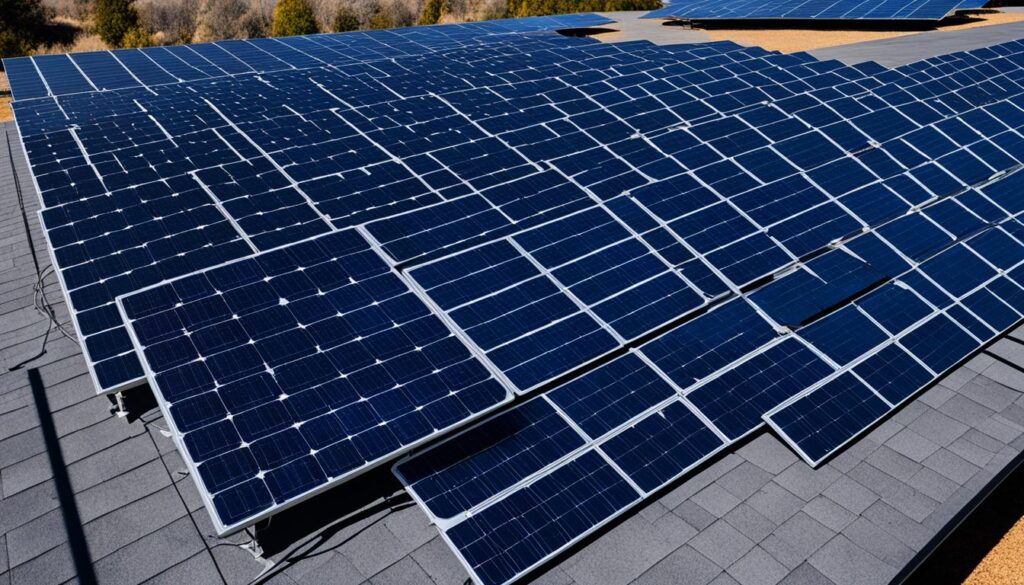
50Ah Battery
A 50Ah battery needs the right solar panel size for good charging. A 100W solar panel works well with it. It makes sure your battery charges well, even with changes in sunlight or weather.
100Ah Battery
A 100Ah battery uses a bigger solar panel. For this size, a 200W solar panel is great. It meets the battery’s higher power needs, charging it fully in a decent time.
200Ah Battery
A 200Ah battery needs an even bigger solar panel. Here, you’d want a 400W solar panel. It meets the big power needs of a 200Ah battery, especially in not-so-perfect weather or sunlight.
Solar panels for a 50Ah might be 100W. A 100Ah needs 200W, and a 200Ah battery does best with a 400W panel. Understanding these examples helps you choose the right solar setup for your power needs.
Optimizing Your Solar Setup for Maximum Efficiency
Getting the most out of your solar setup is key to top energy performance. It’s all about where and how you place them to catch the most sunlight.
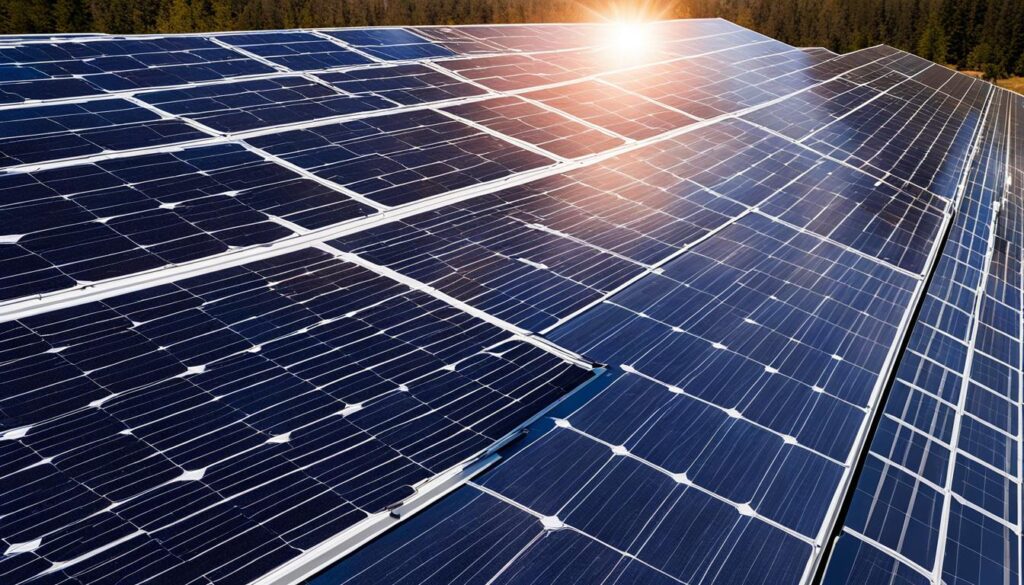
Positioning and Angle of Solar Panels
The angle you set your solar panels makes a big difference. Aim to match the panel tilt with your area’s latitude. This advice stands true throughout the year. For homes, a south-facing roof usually works best. Watch out for any shady spots caused by trees or buildings.
Weather and Seasonal Considerations
The sun’s position changes with the seasons, affecting panel efficiency. In winter, you might need to adjust your panels to get more light. Areas with lots of clouds might not get as much solar power. Keep an eye on the weather to make the best use of your system.
Use local guidelines for the best solar panel setup tips. This will help your panels soak up the sun efficiently, no matter the weather.
Conclusion
Wrapping up, we’ve looked at how to choose the best solar panel for a 12V battery. It’s clear that understanding your battery’s needs and the right solar panel settings is key. I hope you feel ready to set up your solar panels for off-grid use.
Solar tech is great for the planet and your wallet. We started with why 12V batteries matter and went through setting up solar panels. Every part we looked at helps make a powerful solar system.
Choosing solar power means a future with less need for big electric companies. It leads to a cleaner, more independent life. Going solar brings big wins: it’s good for the Earth and saves you money. Remember, a good system is more than just parts. It’s a step towards a sustainable lifestyle that fits you.
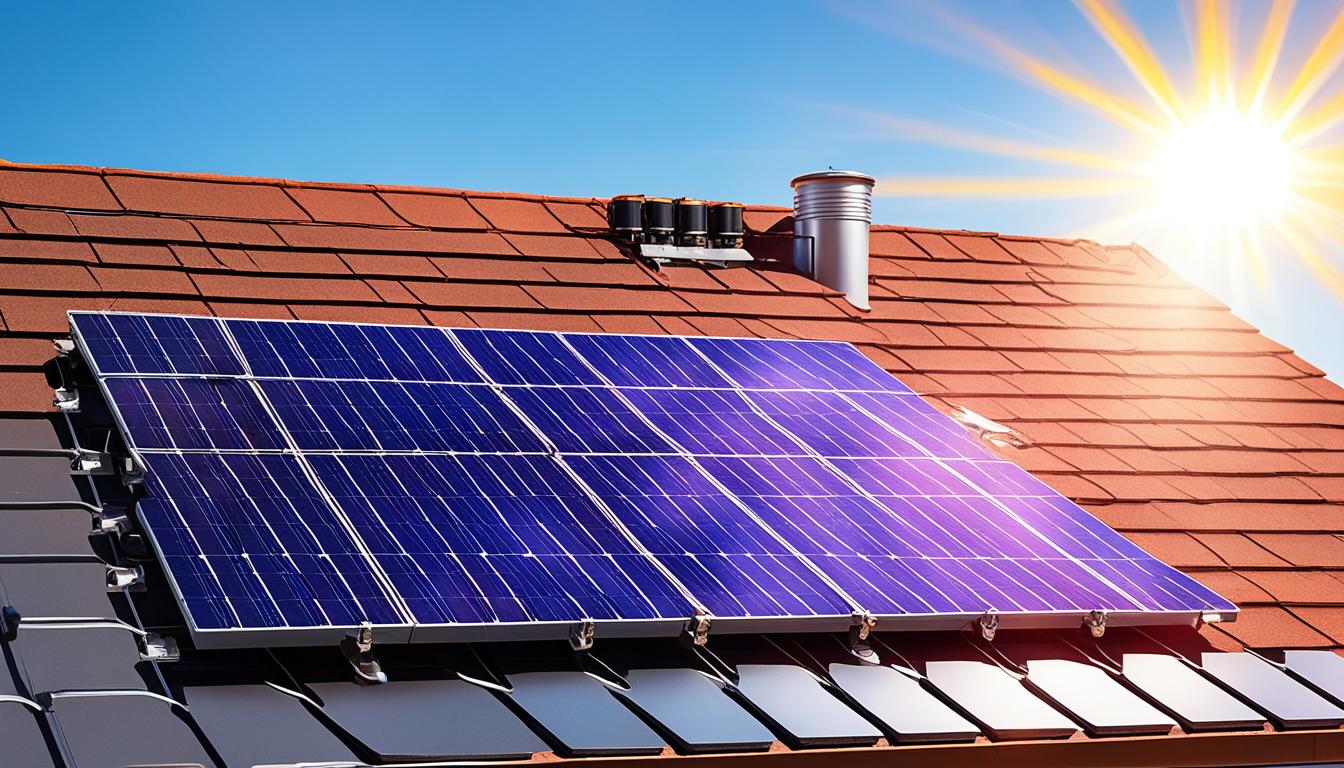



Honestly, I found this article a tad bit simplistic. Why not delve deeper into the challenges related to solar charging? I mean, what happens on cloudy days or during winter? Also, wouldnt it be beneficial to discuss the possible effects of non-optimal angles or panel orientation on charging efficiency? Just some food for thought, guys.
Interesting read, but have we considered the impacts of solar panel production on the environment? Sure, theyre great for charging 12V batteries, but the manufacturing process isnt so eco-friendly. Plus, what happens when these panels reach the end of their life? Just food for thought, folks.
Interesting read, but arent we missing the point here? The article talks about 12V batteries and solar panel sizes, but what about the cost? Solar panels arent cheap, and the return on investment takes years. Plus, what about the environmental impact of producing these panels? Just saying, we might be trading one problem for another.
Interesting read! But dont you think that the efficiency of solar charging might be affected by geographic location or weather variations? Not all places get ample sunlight year-round.
Interesting article. But, wouldnt it be more efficient to have solar panels directly power our devices rather than charging a 12V battery? Just a thought!
Interesting piece! But wouldnt it be beneficial to also discuss the potential drawbacks of solar charging? I mean, not everything is sunshine and rainbows, right?
Interesting read, but isnt it more efficient to charge a 24V battery with solar? Also, what about cloudy days? Not all sunshine and roses, right?
Interesting read, but dont you think were ignoring the environmental impact of solar panel production? Just a thought.
Interesting read, but isnt relying solely on solar charging risky given weather inconsistencies? What about cloudy or rainy days? Just a thought.
Interesting read, but isnt it more cost-effective to charge a 12V battery with a traditional charger? I mean, the prices of solar panels are still high. Why not focus on lowering the costs first?
Interesting read, but isnt it more practical to use a grid-tied solar system instead of charging 12V batteries? Just thinking about the convenience and long-term savings. Thoughts?
Practicality isnt always the best solution. Sometimes, convenience trumps long-term savings.
Interesting read, but arent we ignoring the elephant in the room? What about solar panel efficiency on cloudy days? Any thoughts, fellas?
Interesting read! But shouldnt we also consider the efficiency losses in solar charging? Its not always about size, right?
Interesting read but isnt it cheaper and more efficient in the long run to just use a generator rather than solar panels?
Ever heard of climate change? Generators arent exactly green, mate. Think bigger than your wallet.
Great read but arent solar panels still too inefficient and pricey for the average Joe? Need more affordable green options, guys! Just my two cents.
Interesting read, but wouldn’t it be more efficient to directly power devices instead of charging a 12V battery? Any thoughts?
Interesting read! But does the efficiency of solar charging still hold up in less sunny climates? Lets discuss.